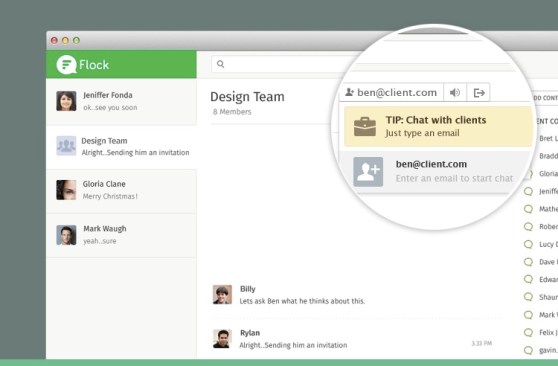Picture this: You’re part of a new project at your company with team members spread across different floors, different buildings, or even different cities. Excited to get started, you want to make sure that the team is able to communicate with each other seamlessly to get the project moving as fast as possible. You turn to email to get your messages across quickly, which is actually a huge mistake. Hours go by simply waiting for people to respond, even if it’s just for a quick update or short confirmation. Ultimately, email is slowing down the entire project.
Sound familiar?
Rapid communication among teams in any organization is crucial for success, yet today’s communication technology offerings seem to fall short when it comes to enterprise. And email has seen little innovation over the last decade, continuing instead to remain slow, asynchronous, and unsuitable for anything requiring speed.
Although workplace chat tools is a nascent space, no one has been able to nail it for businesses.
Take for instance consumer-driven instant messengers like Skype, Google Hangouts, WhatsApp, and others. These apps make you share your personal IDs with colleagues, bosses, and clients, which is just not something everyone feels comfortable doing. Mixing your professional conversations with personal exchanges can be a recipe for disaster, and using different channels for different clients or work contacts can become confusing and oftentimes messy.
Another example of bad enterprise messaging is Microsoft Lync, a platform for unified enterprise communications. Few organizations can really use a messaging solution like this. It’s incredibly expensive for small and medium-sized businesses, and requires an IT taskforce to set it up effectively and maintain.
Alternative services like Yammer and SharePoint are available, but the problem is the rate of adoption on these services is extremely low. According to a report from Forrester, 54 percent of businesses said they do not see the level of adoption they expected, while 51 percent said users just don’t like the SharePoint experience. That’s not to say you shouldn’t check out the few enterprise-level services that are actually attempting to fix the problem of bad team-level communication.
A few forcing enterprise messaging to evolve
The enterprise messaging space has certainly evolved over the past few months, with new chat apps offering a myriad of solutions are working to fill the much-needed gap. One such app is Flock.co, a multi-platform messenger for teams and businesses with desktop and mobile clients. There’s also Slack, a power user-messaging software that provides various integrations that make it easy for software engineering teams to integrate with Github. Another worth mentioning is Cotap.
Easy to use with little to no IT support, these apps can be installed by anyone in the organization. Both Flock and Cotap include multi-platform support, too. Other features include synched conversations, group chat, auto populating company directories and chat usernames, secure conversations, file sharing, chat history, admin interfaces, and more.
Flock.co, Slack, Cotap, and other similar offerings provide a much required alternative to using personal messaging apps in the workplace and maintain the separation between your employees’ work and personal lives. With little to no cost and no IT staff to support, organizations that adopt this new wave of instant messaging solutions are finding them a handy replacement for email — and spending several hours a day using them while increasing efficiency through easier collaboration.
Unified communication apps can make a real impact for a business, not to mention considerably improve productivity of its workers. But as previously mentioned, the new wave of enterprise communication services have yet to reach critical mass among companies. It will, however, be interesting to see how this space plays out over the next few years, and I expect we’ll see some very interesting innovations going forward.
 Bhavin Turakhia is the CEO of international calling service Ringo as well as a serial entrepreneur. He has founded and continues to run several successful businesses, including BigRock, Resellerclub, Logicboxes, and Radixregistry.com. He is passionate about the communications space, and envisions a world where high-quality communication is free for the masses.
Bhavin Turakhia is the CEO of international calling service Ringo as well as a serial entrepreneur. He has founded and continues to run several successful businesses, including BigRock, Resellerclub, Logicboxes, and Radixregistry.com. He is passionate about the communications space, and envisions a world where high-quality communication is free for the masses.
VentureBeat's mission is to be a digital town square for technical decision-makers to gain knowledge about transformative enterprise technology and transact. Learn More


